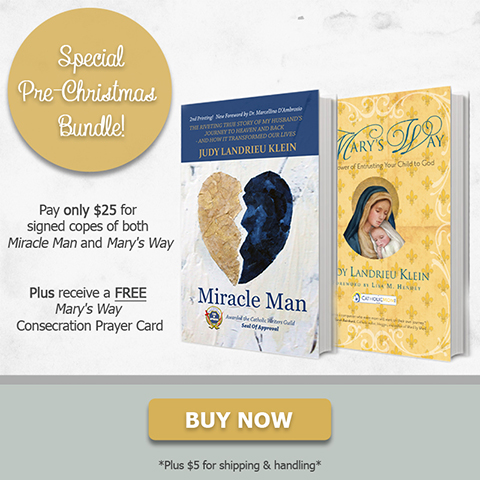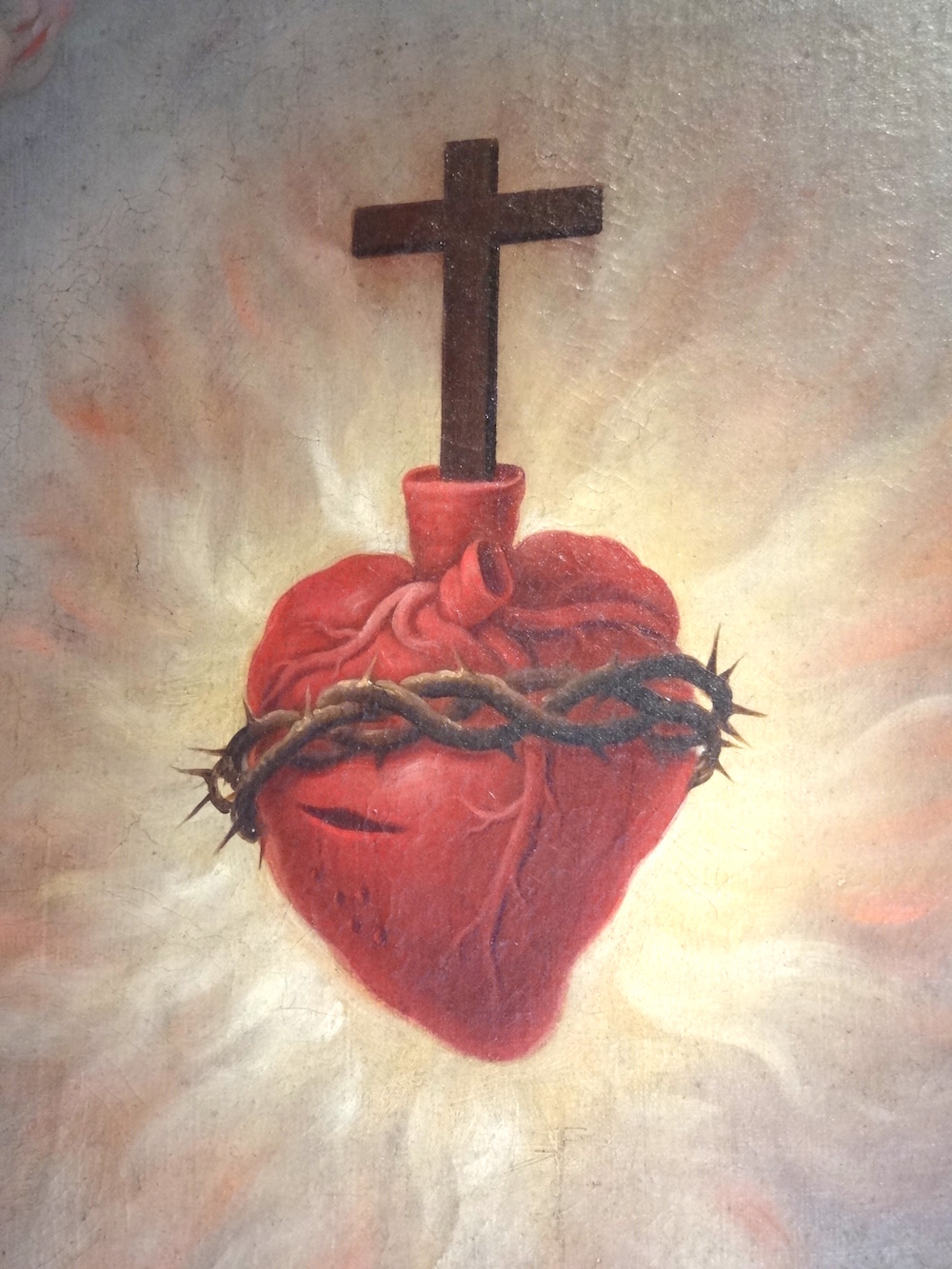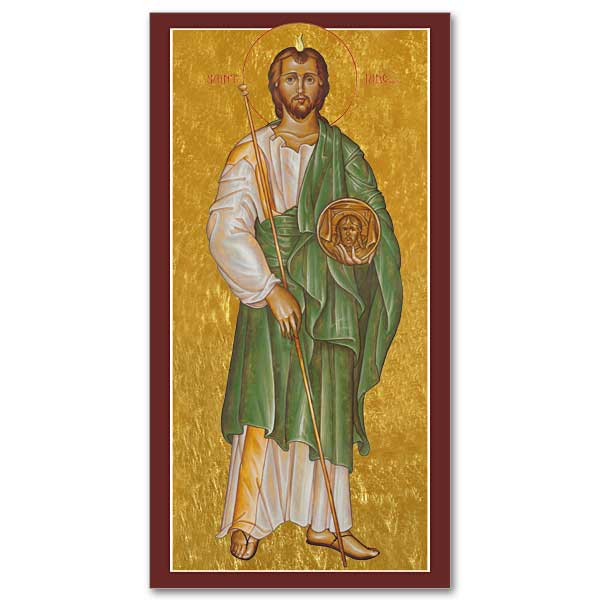As #MeToo campaigns rage and countless men are outed for the sexual harassment, abuse and assault of women, it may be time to look to a woman—THE WOMAN—for the answer on how to heal this mess...
Read moreIs Purgatory A Far Away Place? Or Does It Begin Here And Now?
While November brings to the fore the awareness of the holy souls in purgatory, the month of All Souls also begets an important question: Is purgatory a far away “place” or is it a state of existence all of us are called to, starting now?...
Read moreHow Unbridled Thinking Keeps Us Beside Ourselves And Unaware Of God's Presence Within
How much time do you spend in your mind, lost in world of racing thoughts concerning anything and everything but the present moment? Do you find yourself habitually living in a state of anxious deliberation fueled by past ponderings or future fears— instead of being fully present to God, yourself and others?...
Read moreA Potent Prayer for the Healing of the World
With the world teetering on the edge of nuclear war and anxieties running high, I humbly share with you a powerful prayer for healing and conversion given to me some months ago in prayer before the Blessed Sacrament. This prayer grew out of the recognition that we can “stand in the gap” in intercessory prayer like Abraham (Gen. 18:23), Moses (Exodus 32:11-14), and Ezekiel (Ez. 22:30), pleading for God’s mercy upon us and upon our broken world...
Read moreFrom Slave To Friend of God: My Son's Story
I no longer call you slaves, because a slave does not know what his master is doing. I have called you friends, because I have told you everything I have heard from my Father. John 15:14-15
No one knew better than Christ that the pain against which we so desperately try to numb ourselves, and all the world’s evil, seem to stem from our terrible fear that we are basically unlovable. Heather King, Holy Desperation: Praying As If your Life Depends On it, 66
Few people I know have experienced the bondage of slavery like my beloved twenty-six year old son, Lucas—who has struggled with a life-wrecking addiction for over ten years; an addiction mercilessly driven by a core belief that he is not loved.
But lately, something has changed. Something akin to a miracle has occurred.
Instead of using words like shame, rejection, fear and punishment, Lucas is suddenly speaking the language of love. Specifically, he’s speaking about having encountered God’s personal, gentle, merciful love for him—an encounter that has changed, well—everything.
“My life has always been about failing, about suffering, about punishment,” Lucas shared with me in a conversation two days ago. “But when I finally came to God in stillness, in quiet, with an open heart and mind, I heard him whisper in my heart—I love you.” As I listened in grateful awe, he continued: “Since I’ve allowed a little bit of that love to seep into the deepest places of my heart—into the darkest things I’ve ever known and done—I’ve seen that has always God loved me, that he only wanted to embrace me, and that he has always been there with me.”
This is precisely how we transform from slaves to friends of God.
My son has a “new way of thinking,” as he referred to it, and it has everything to do with coming to believe that he is deeply loved by a merciful God, and that he’s called to live out of that reality. This new way of understanding has convinced him that many people aren’t interested in God because they have the wrong idea about who God is, thinking of him as a punitive, exacting taskmaster instead of “as a gentle Father whose love and mercy hold the world together.”
Believe me, I know words can be cheap. But when you hear those words coming from the depth of a son’s heart—a son who’s been afflicted for so many years—you know something has radically changed. And you genuinely rejoice.
“Punishment is not who God is!” Lucas stated emphatically. “He is love and what he wants is our hearts. People need to know that we are loved by a Father who wants to heal us, set us free, and bless us. And we can’t know that until we personally know who God is.”
Lucas went on to say that he now recognizes that recovery—freedom from slavery to drugs—is not about shaming himself out of screwing up or beating himself over the head for falling. “Recovery is about healing the broken heart,” he concluded with conviction. “It’s about opening up, trusting, and allowing ourselves to be vulnerable to God and to others. What matters is that we are loved, and when we live our lives based on that fact, we become free.”
Indeed, I hear the sweet freedom of a friend of Christ in my son’s voice, a young man who has discovered at last that Christ’s “friends” are “those whom he loves.” I see the liberty of a child of God who has finally heard the voice of the Father whispering: You are my beloved son in whom I am well pleased.
Such is the cry of freedom of the children of God, freedom won only through love.
This article was previously published at Aleteia.
How Dung Helps Flowers Grow: What God Does With Our "Crapola"
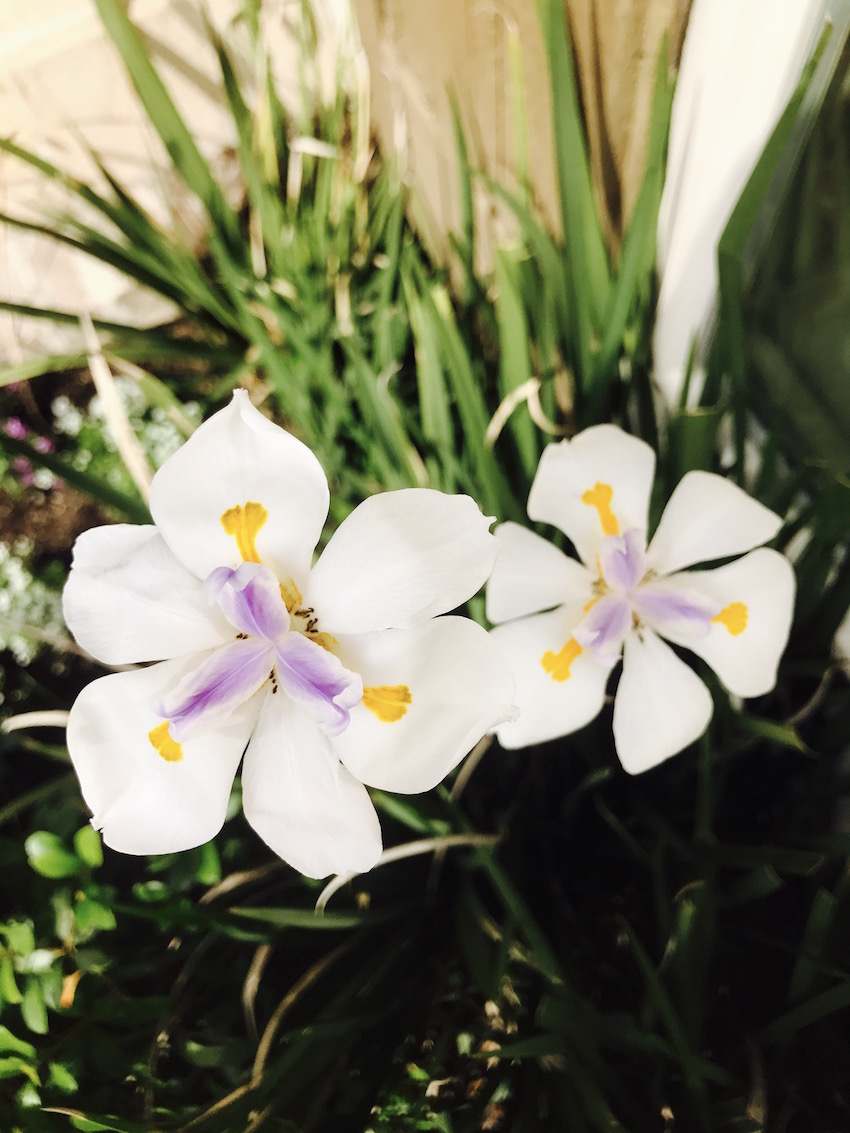 I will heal their defection, says the Lord, I will love them freely; for my wrath is turned away from Israel. I shall be like the dew for Israel: he shall blossom like the lily; he shall strike root like the Lebanon cedar, and put forth his shoots. His splendor shall be like the olive tree and his fragrance like the Lebanon cedar. Hosea 14: 5-7
I will heal their defection, says the Lord, I will love them freely; for my wrath is turned away from Israel. I shall be like the dew for Israel: he shall blossom like the lily; he shall strike root like the Lebanon cedar, and put forth his shoots. His splendor shall be like the olive tree and his fragrance like the Lebanon cedar. Hosea 14: 5-7
It happens every spring. Just as I’m walking around the neighborhood gleefully absorbing the exquisite sights and smells of sweet Louisiana blooms, I get a whiff of something putrid.
Then I remember.
Dung is used as fertilizer in many local gardens, and my garden always does best when I buy the soil advertised as laden with cow manure.
I don’t know about you, but some days I feel plain 'ole crappy about my life. I agonize about mistakes made, opportunities missed, and relationships mired in misunderstanding. I spew apologies, wish for do-overs and rake myself over the coals.
The mercy is, when I finally settle down enough to ground myself in God’s presence, I don’t get mud thrown in my face. Instead, I hear the Lord’s gentle voice whispering: I will heal your defections…I will love you freely…you shall blossom like the lily.
We can be master builders of our own whipping posts, ready and willing to bind ourselves inexorably to every last lash. We can view our failures to love in endless 3-D projections, seeing only the terrible tearings that teased out death. We can rend ourselves asunder with regret, obsessing over our belief that we were supposed to get things right.
We can even call this humility, when the sad fact is that all of this rumbled reasoning reeks of an unholy focus on self, not of holy faith in God.
Because faith in God means that we see our defects—redeemed by God’s grace—as glorified gashes in our humanity capable of spawning new life. Faith in God means we trust that when our personal capabilities crash, God’s competence rises up to save us. Faith in God means that we adjust the lens of our reality to magnify God’s magnanimous mercy instead of our many measly mistakes.
What faith basically means is just that this shortfall that we all have in our love is made up by the surplus of Jesus Christ’s love, acting on our behalf. He simply tells us that God himself has poured out among us a superabundance of his love and has thus made good in advance all of our deficiency. Ultimately, faith means nothing other than admitting that we have this kind of shortfall; it means opening our hand and accepting a gift. Joseph Ratzinger (Pope Emeritus Benedict XVI), What It Means to Be A Christian
In other words, we can’t. God can. Will we let him?
Johann Wolfgang von Goethe once said: "The best fortune that can fall to a man is that which corrects his defects and makes up for his failings." I’d call that fortune grace. What sweet relief that our “dung,” infused with God’s grace, becomes fertile territory where fragrant trees grow and flowers bloom.
Healing Our Decembers
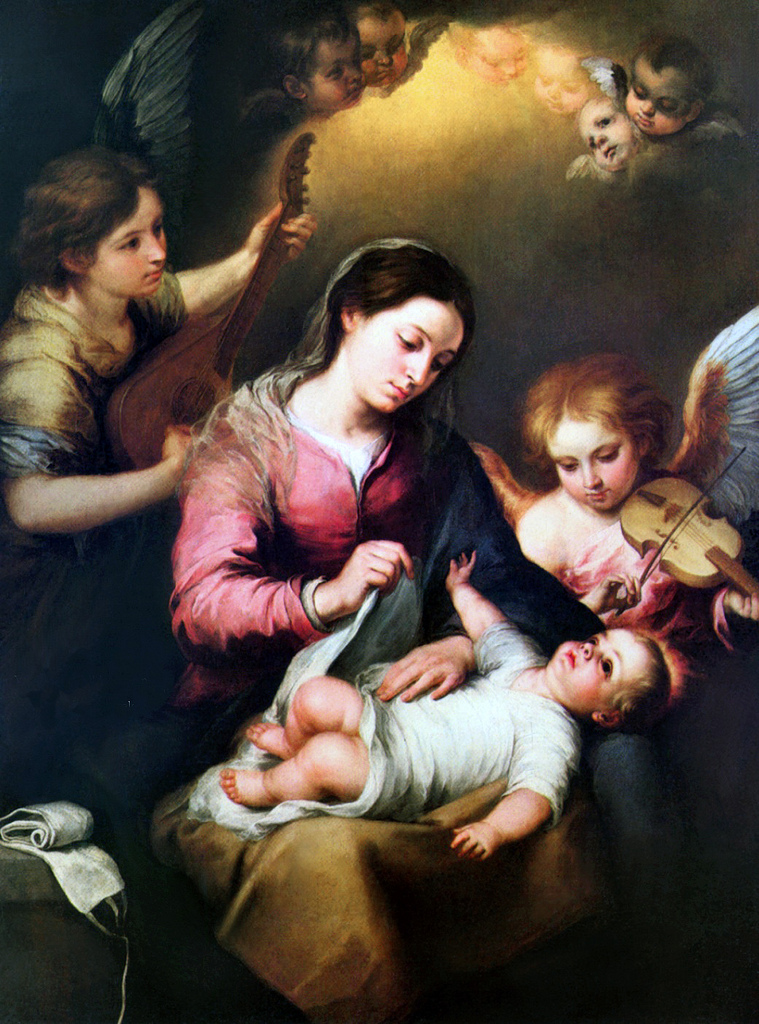 Tears flowed freely during the meeting with my spiritual director, Sandy, as I shared with her the pain I was feeling. “December is here,” I said. “I get such a wave of anxiety and grief at this time of year.”
Tears flowed freely during the meeting with my spiritual director, Sandy, as I shared with her the pain I was feeling. “December is here,” I said. “I get such a wave of anxiety and grief at this time of year.”
Somehow, I have a hunch I’m not alone in experiencing December this way.
December is the month that “our lives blew apart with more violence than we ever dreamed possible,” I wrote in my book Miracle Man. The month that my late husband, Bernie, suffered a massive heart attack—leaving my children fatherless and me a widow after 87 excruciating days in the ICU. Eight years and a wonderful new marriage later, December still brings it all screeching back.
“Beg the Lord to heal the trauma of all your past Decembers,” Sandy wisely advised. “And ask him to fill you with the joy of his birth.”
For December is also the month when we celebrate our Savior’s presence penetrating Earth’s agonies, defying what human eyes behold as mere babe-flesh, disguising the God-man. This is the month that Hope is born, ushering in the time of fulfillment for the long-awaited healing of our crippled souls and lame lives. December is, indeed, the month of Advent hope.
The hope of Advent lies in experiencing the reality of human frailty—and in believing that Someone, though fragile in appearance, is coming to heal us soon. The hope of Advent consists in a hearty cry for deliverance from the weight of sin and death—and in trusting that God’s glory-weight will pierce right through all of this world’s darkness. For we have all known the sorrow of “Decembers” during life’s winter months, times of shadows and suffering where we cry out for the Light to come.
Every year I’m reminded that December is a fitting backdrop for Advent, as it is the month that throws off the least amount of light in the calendar year. The days grow short and winter begins. The darkness brings with it a certain sense of vulnerability and disorientation, along with the knowledge that we need more Light, so we can see.
Advent hope has everything to do with vision. Advent hope is inexorably connected with eternal perspective. That’s because hope—Christian hope—is so much more than plain old wishful thinking. It is the theological virtue by which we order our lives toward heaven; the virtue that establishes trust in us that there is a heaven, and gives us the conviction that we’ll live there with God some day. Hope reminds us that this earth is not paradise, strengthening and sustaining us as we travel toward the longed-for Promised Land. Hope gives us a new vision for our lives, enabling us to see that what may look like “disaster” to human senses is but a moment of time that God holds in his hands, shaping it for our good, while simultaneously, mysteriously, molding us into good.
“Can you see your Decembers as a time when God reaches into your life to work miracles, instead of as a time of sorrow?” Sandy gently asked. “You saw that once,” she continued. “You wrote a book about it.”
Yes, I saw it clearly then. But somehow I go blind every December.
And maybe that’s as it should be. Since it is December’s darkness that beckons me to encounter my desperate need for a Savior. Along with my need for a divine infusion of hope.
Thankfully, it is Advent. The season of so much blindness healed. The Church’s daily readings ring out promises of what the Messiah will bring, along with rich Gospel accounts of those promises being fulfilled:
On that day the deaf shall hear…and out of gloom and darkness, the eyes of the blind shall see. The lowly will ever find joy in the Lord, and the poor rejoice in the Holy One of Israel. Isaiah 29:18-19
And then we hear:
Two blind men followed him crying, “Son of David, have pity on us!” …Then he touched their eyes...And their eyes were opened. Matthew 9:29-31
Touch our eyes, Lord, and enable us to glimpse reality from heaven’s angle, through the lens of Advent hope. Heal all of our Decembers, and fill us anew with the joy of your birth.
Last week to order our Pre-Christmas Special: Get signed copies of both books, “Miracle Man” and “Mary’s Way,” for a bundle price of $25 right now at www.memorareministries.com. Free “Mary’s Way” Consecration Prayer Card included.
When Mercy Makes Us Bleed: A Commentary on Healing Our Collective Corruption
Jesus said to them in reply, “Those who are healthy do not need a physician, but the sick do. I have not come to call the righteous to repentance, but sinners.” Matthew 5:31-32
If then my people, upon whom my name has been pronounced, humble themselves and pray, and seek my face and turn from their evil ways, I will hear them from heaven and pardon their sins and heal their land. 2 Chronicles 7:14
In God we trust. The Currency of the United States of America
One of my favorite spiritual insights is that healing—real healing—looks more like the lancing of an infected boil than the shooting of a magic bullet. A missionary friend of mine likes to joke that most of us prefer to think of God as a magic unicorn who fires rainbow colored darts from his enchanted wand—when in reality God is more like a skilled surgeon coming at us with the sharpest of knives. Of course, I fully realize that we are speaking in limping analogies here, but how else can we talk about God other than symbols and stories?
When I was a kid, my cousin Melanie and I made the genius decision to sneak off together to ride the family’s red Honda 90 motorbike to the beach near our summer camp. We planned to jump the sand dunes, just like our skilled, cycle-riding brothers regularly did. Being amateurs in motor sports, we opened up the gas full throttle at the sand dune, causing the bike to flip in the air and land right on top of us. The scalding hot exhaust pipe left a third-degree burn on poor Mel’s leg—which she proceeded to hide under her jeans for the next two weeks so we wouldn’t get into trouble. Needless to say, by the time her mother discovered the burn it was badly infected—with Mel limping severely and practically in shock from the wound. It would take a deep cleaning plus weeks of hard medicine to heal the injury, which could have been dealt with much more effectively had we only been forthcoming about our misdeed instead of hiding it.
How often do we find ourselves hiding our sins and infections from God, instead of just coming clean about our inner maladies? We posture and pretend, using all of our energy to cover our abscesses, instead of bringing them into the glaring light of day. We hide our misery to the point of madness, instead of admitting that we are sick patients in need of significant soul-curing remedies. Somehow, we keep believing in magic instead of mercy, wanting the wand treatment instead of God’s penetrating love, which cuts through and exposes our deepest disorders.
Part of the problem today, as I see it, is that we’ve grown collectively dishonest, all corroborating in creating the current climate of corruption. We point our fingers at “them” and “their” faults, without admitting that “they” represent “us.” You spot it, you got it, is another way of naming this reality, and what we’ve spotted surreptitiously via scrubbed servers and secretly hidden cameras has indicted every single one of us. When rampant corruption, greed, powermongering, pomposity, and disrespect for the human person become the hallmarks of our leaders, then “Mea culpa!” must be our communal contrition cry.
I can’t help but wonder if this wide-open wound exposure of the shocking level of disingenuity in the political sphere is the direct result of the Year of Mercy, which will end this month on November 20, the Feast of Christ the King. One of the things Pope Francis explicitly, and quite prophetically, addressed in the Papal Bull that opened the Jubilee Year was corruption, and its damning effect on society:
May the message of mercy reach everyone, and may no one be indifferent to the call to experience mercy. I direct this invitation to conversion even more fervently to those whose behavior distances them from the grace of God…For their own good, I beg them to change their lives.
The same invitation is extended to those who either perpetrate or participate in corruption. This festering wound is a grave sin that cries out to heaven for vengeance, because it threatens the very foundations of personal and social life. Corruption prevents us from looking to the future with hope, because its tyrannical greed shatters the plans of the weak and tramples upon the poorest of the poor. It is an evil that embeds itself into the actions of everyday life and spreads, causing great public scandal. Corruption is a sinful hardening of the heart that replaces God with the illusion that money is a form of power. It is a work of darkness, fed by suspicion and intrigue. “Corruptio optimi pessima,” said Gregory the Great with good reason, affirming that no one can think himself immune from this temptation. If we want to drive it out from personal and social life, we need prudence, vigilance, loyalty, transparency, together with the courage to denounce any wrongdoing. If it is not combated openly, sooner or later everyone will become an accomplice to it, and it will end up destroying our very existence. (Pope Francis, Misericordiae Vultus, 19)
The wound has been exposed, the boil lanced, and the medicine of mercy has been offered. Maybe the Year of Mercy has served its healing purpose after all.
This article was previously published at Aleteia.
My St. Jude Miracle: God Changed My Name From Hopeless Cause to Praise Of God
Feast of St. Jude
You shall be called by a new name pronounced by the mouth of the Lord…No longer shall men call you, “Forsaken,” or your land “Desolate,” but you shall be called “My Delight,” and your land “Espoused”. Isaiah 62:4
It came on like a bad hangover before I’d even sipped the cup. The lump in my throat burned with the double embers of shame and regret: shame over my screwed-up life, suffering-infused life; regret over my decision to speak about it at a large Catholic conference.
The inner slamming began at the airport, the second I got into a car with another conference speaker. Pumped up like a heavy lifter, he gave me the run-down on his whole amazing family during the drive to the hotel.
“My oldest son is 22, and he’s a gifted videographer who’s already earned enough money to buy his own house,” he began. “My second child, a daughter, is brilliant. She runs my ministry full time.” On it went, blah, blah, blah, as I sunk down into the back seat wondering how I’d become the poster child for suffering—the topic I was asked to speak about at the conference.
How has his life managed to go so right, and mine so wrong? I began to agonize before I could even access a scripture verse or slogan I try to live by, such as “Compare and despair,” or “We know that all things work for good for those who love God, who are called according to his purpose.” (Romans 8:28)
The weekend conference happened to be taking place on the dual anniversary of my late husband’s death to a massive heart attack and my brother Stephen’s death by suicide. I was already feeling emotionally brittle when I left home, and the account of my fellow speaker’s thriving family burned like salt in open wounds. Stupidly, I’d forgotten the upending sting of tragic anniversaries and the grief they evoke when I’d agreed to the speaking engagement. I’d also forgotten how easy it is to be thrown back into an old, worn-out narrative—a story we believe about our lives or ourselves that keeps us bound to self-rejection and hopelessness.
Hopeless cause, I brooded as we rode along to the hotel. Yep. That’s my name and my story.
I’d heard the story my whole life: My sweet, young Mama had caught the Asian flu in the final weeks of her pregnancy, and prayed a novena to St. Jude that I wouldn’t come down with it and die. I caught it anyway, and my serious infant illness caused her endless anxiety as she stood over my bassinet for days listening to see if I was still breathing. She named me after St. Jude, given both the novena and the fact that I was born the day after his feast day. I guess St. Jude came through in the end, because I lived to tell the tale. I joked throughout life that I was a “hopeless cause” when telling the story—until my life my life imploded and I began to own the moniker.
Hopeless cause. That’s my name and my story, I repeated to myself with self-pity as I wheeled my suitcase weepily into my hotel room.
And then I remembered God’s voice, thundering loudly in my heart one day: Your name does not mean hopeless cause. It means praise of God! I had heard God speak with such piercing clarity that I’d wept at the holy force of the message.
"What matters in life is not what happens to you but what you remember and how you remember it,” novelist García Márquez once wrote.
What would I remember about my one hallowed life, and how would I choose to remember it?
Would I remember my life not as suffering-infused, but as glory-filled—thanks to all of the outrageous ways God has shown up? Would I memorialize tragic days as sacred days—recalling what God did for me instead of what life dealt me? Would I see beyond grey ashes to silver linings—indulging myself in God’s graced perspective instead of my own puny perceptions?
Help me, God, I prayed. Help me remember what you’ve done for me.
“I’m not here to talk about suffering today,” I heard myself declare convincingly as I stood at the podium later that afternoon. “I’m here to tell you about God’s glory!” I then listened to myself tell my own story with honest amazement and gratitude over the marvelous works and ways of God all along the way. God had changed my name—and my story—from hopeless cause to praise of God.
I put water in the desert and rivers in the wasteland for my chosen people to drink, The people whom I formed for myself that they might announce my praise. Isaiah 43:20
This article was previously published on Aleteia.
The Painful Pruning of Our Diseased Hearts and the Glorious Mark of the Cross
They will be called oaks of righteousness, the planting of the Lord to display his glory.
Isaiah 61:3
They were at it again when I woke up this morning: amputating dead limbs from the majestic oak trees that line the brilliant white beaches of Pass Christian, Mississippi, which is perched like a pearl on edge of the Gulf of Mexico. Lying in bed at my sister Jojo’s tranquil beach house, I could hear the saws humming since practically the crack of dawn.
I’ve reflected a lot on the oaks in recent years, especially since they’re the only things that stayed standing when a massive tidal surge slammed these shores during Hurricane Katrina. That, thanks to deep roots grown over many long years, roots that held the trees in place when the “hundred year storm” swamped the entire Mississippi Gulf Coast. And though the oaks survived the hellacious storm, it’s been an ongoing project ever since to trim their dead branches, branches that require constant stripping in order for the trees to grow and prosper.
He takes away every branch in me that does not bear fruit, and every one that does he prunes so that it bears more fruit (John 15:2). I thought of Jesus’ words as I took a long walk beside the beach later in the morning, observing how many dead oak branches still need to be cut off. Like the oaks, we must all encounter the necessary pain of pruning, as the Divine Grower mercifully strips away everything in us that hampers our growth in him. Paradoxically, when God wields the pruning shears it is not for our destruction, but that we might have life. I experienced this first hand the year my late husband Bernie died, a year when many of my diseased beliefs about God were cropped off as a Category 5 storm blasted our lives.
I’d been dreaming about Bernie when I woke to the sound of saws, probably because yesterday was his birthday. Hit by a massive heart attack seven years ago, Bernie was given the great grace of undergoing a near-death experience, of clearly seeing the condition of his soul, and of being sent back by God to undergo, as he put it, “necessary purification.” Over the course of three long months in the ICU, Bernie suffered profusely as his life was stripped away, all the while discovering inexplicable peace, joy and love as the pruning hand of God reordered the very depths of his soul. Previously a very driven man, Bernie found himself devoid of all power, possessions and productivity, laid bare before a merciful Father who wished to communicate only one thing his broken son, a mantra Bernie would repeat many times during his short time left on earth: You have no idea how much God loves you.
When Bernie got sick I, too, was in need of radical healing; healing of my trust in God’s unbounded goodness. A deep wound of mistrust in God had festered in me since childhood, keeping me in a defensive posture against a distorted image of an angry, exacting God I believed was out to get me. It wasn’t until an unexpected cyclone hit our lives that those distorted beliefs were cut away, when I personally experienced the miraculous love and goodness of a Father who demonstrated in no uncertain terms that he would not only hold me steady in the teeth of death and devastation, but would do so with unspeakable tenderness and love.
So much of our walk with God is about encountering the inevitable storms of life, and about what the tsunamis that hit us expose in our hearts. Do we trust the Lord with all of our hearts, believing that he’s not out to get us, but that he’s got us? Do we believe that God loves us, that he is good and that he works all things together for our good, even the things we may consider disastrous?
One thing I noticed about the oaks is that they each bear a telling mark of their stripping; a mark that often takes the shape of a cross. The cross that takes shape in their flesh is a sign not only of their struggle for survival but of their pruning, the very pruning that leads to transformation and new life.
This article previously appeared at Aleteia.






